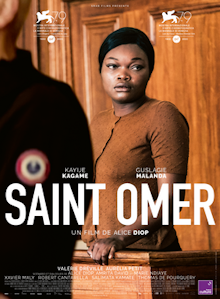There’s no indication of it in the film itself, but this was based on the real-life murder of an infant by her mother in France and director Alice Diop attended the trial just as the main character here does. As a courtroom drama, it’s very talky with long scenes of the characters delivering their statements. It’s also a case in which all of the facts seem immediately clear, plain as day. Yet the lesson Diop teaches here is that there is still the matter of perspective as each person presents the facts in a way that benefits themselves as we struggle to understand the incomprehensible horror of why a mother would kill her own child.
Rama is a French literature professor and writer who has ancestral ties to Senegal who has a difficult relationship with her mother. She travels to the commune of Saint-Omer to attend the trial of Laurence Coly who has been accused of murdering her own infant daughter Elise. This is ostensibly as research to write her own retelling of the Greek tragedy of Medea but as the trial progresses, she becomes emotionally embroiled in the case. Under questioning from the judge, the story of Coly’s life unfolds. She was a clever student in Senegal and well educated in the French classics. She arrived in France to study law, staying in an aunt’s apartment in France. She subsequently fell out with her relatives and struggled to do well in school. Her father cut off his financial support after she decided to switch to studying philosophy and she subsequently moved in with a much older and already married French man Luc Dumontet. Dumontet seemingly keeps her as a hidden mistress and Coly becomes isolated from her family and everyone else. She similarly keeps her pregnancy secret and delivers the infant herself without registering the birth. Then fifteen months later, she travels alone with the child to the seaside town of Berck-sur-Mer and leaves her on the beach to be washed away by the ocean.
There’s a huge disconnect in the film, seemingly by design. Rama is supposedly the protagonist but once the trial is underway, the film revolves entirely around Coly and her life. The two never speak and the only interaction they have is a knowing look they share in the courtroom. We get only indirect hints of what Rama truly thinks or feels about the case and we get none of her own backstory. Still, it’s easy enough to read between the lines. In Coly’s story, Rama sees how her own life might have gone but for a twist of fate. Both are black women with Senegalese origins. Both are well-educated and hoped to achieve something in the humanities. Both are estranged from their own mothers. Both entered into relationships with white Frenchmen and Rama too is pregnant as she attends the trial. It is utterly horrific and unthinkable to her to murder her own child of course, yet she must have also seen in Coly’s life how the pressures, expectations, disappointments and cultural disconnect might have driven her to such a desperate decision. I would have liked a little more insight into what is going on inside Rama’s mind but I appreciate that it isn’t easy to articulate the complexity of the feelings involved. Diop might also have wanted to avoid undue judgment out of respect of the real-life case that inspired the film.
Both the judge and the prosecutor mercilessly question Coly about her state of mind and her motivations. Honestly I feel that any of us would do the same out of frustration. What made her stay with Dumontet for so long when he obviously doesn’t love her? Why did she hide the pregnancy from her own family? Why did she seemingly give up on her studies in France? The truth is probably prosaic and unflattering. Cut off from her support network in Senegal, she became undisciplined and unmotivated. When pushed, she claims that her mind and spirit was attacked by malicious sorcery. By the end, the only response she can offer is a helpless “I don’t know.” It’s not very satisfying but it’s probably as close to the truth as anyone can ever get. There’s a subtle bit of racism when Coly’s professor claims that her choice of Wittgenstein as a subject for her thesis proves that she was never serious about her studies. After all, what would a girl from Senegal know about an early 20th-century Austrian philosopher? Overall however her Senegalese ancestry doesn’t have that much to do with her story save that it leaves her more isolated in France.
Diop is apparently a filmmaker who has made several documentaries but this is her first feature film. I like how she takes a simple yet shocking news item, presents the facts in a very straightforward manner, and teases out the different perspectives surrounding it. Rama and Coly may be two very different women and on the face of it, Rama has everything in life going for her: a loving partner with a baby of her own on the way, success as a writer, financial security and autonomy. Yet she could have been another Coly and that is a powerful realization indeed.
